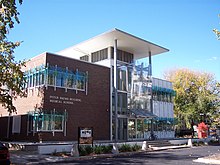ANU College of Health & Medicine
 Peter Baume Building, Acton Campus, Canberra, pictured in 2007. | |
| Type | Public university college; research university; medical school |
|---|---|
| Established | 2017 (formerly ANU College of Medicine and Health Sciences and ANU College of Medicine, Biology and Environment) |
Parent institution | Australian National University |
Academic affiliation | |
| Dean | Professor Ross Hannan (Acting Dean) |
| Location | , , |
| Website | health |
| [1][2] | |
The ANU College of Health & Medicine is an Australian university college for the study of medicine, psychology, mental health, epidemiology and population health at the Australian National University (ANU), located in Canberra, the capital city of Australia.
The College includes both undergraduate teaching departments and several research schools, with a focus upon different areas of the medical and health sciences. The College includes the John Curtin School of Medical Research, ANU Medical School, National Centre for Epidemiology and Population Health, and Research School of Psychology.
History
[edit]The College forebears were grounded in 1946 when the ANU was established by an Act of Federal Parliament, with medicine being one of the four founding research institutes. Through the influence of Howard Florey, in 1952 laboratories for the Research School of Physical Sciences were opened; and during the 1960s the Research School of Biology was established. By 1967, the University established the Research School of Chemistry and the Research School of Biological Sciences; and several years later, the Research School of Earth Sciences was created, separated from the Research School of Physical Science; and the Centre for Resources and Environmental Studies was established by Professor Frank Fenner.[3] Formerly the ANU College of Medicine and Health Sciences, following independent reviews of the ANU disciplines of Chemistry[4] and biosciences,[5] the College of Medicine, Biology and Environment was formed in August 2008.[1][6]
In 2017 the College of Health & Medicine was established to incorporate the John Curtin School of Medical Research, ANU Medical School, Research School of Population Health and Research School of Psychology.[7] However, in October 2024 the College of Health & Medicine was flagged for dis-establishment as a part of the Renew ANU reform program, due to overarching university-wide funding cuts,[8] in spite of the College's consistent high performance and upcoming plans to build a new national health precinct.[9] In the month prior to the Renew ANU announcement, the Dean of the College Professor Russell Gruen stepped down from his position after six years in the role, with Professor Ross Hannan stepping-in as interim Acting Dean. The John Curtin School of Medical Research and the School of Medicine and Psychology were flagged to merge with the ANU College of Science, to be re-branded as the ANU College of Science & Medicine.[8]
Academic courses
[edit]The College offers undergraduate, post-graduate and honours academic courses and research degrees. Course offerings include the MChD (Latin: Medicinae ac Chirurgiae Doctoranda) program through the ANU Medical School, studies in biotechnology, genetics, health science, medical science, psychology, and science; and the only Bachelor of Philosophy (PhB) program in Australia.[10]
Research
[edit]The College's academic research themes include ageing, applied epidemiology, biochemistry, biomedical science, biotechnology, the brain and the thinking mind, cancer, chemistry, chronic illness management, emotions, forensic psychology, genetics, genomics, health policy, human behaviour, human resources and organisational performance, immunology, infectious diseases, understanding and treating mental health, neuroscience, obesity and metabolic disorders, perception, public health data, social cohesion, and more.
See also
[edit]References
[edit]- ^ a b "Annual Report 2008" (PDF). Australian National University. 2008. p. 1. Retrieved 23 September 2016.
- ^ "Annual Report 2015" (PDF). Building blocks. Australian National University. 2015. p. 38. Retrieved 23 September 2016.
- ^ Sweet, Melissa (23 November 2010). "Remembering Frank Fenner: one of our greatest medical scientists (and a thoroughly decent human being)". Crikey. Retrieved 26 September 2016.
- ^ "Report of the 2008 Review of Chemistry" (PDF). Australian National University. April 2008. Retrieved 23 September 2016.[permanent dead link]
- ^ "Report of the 2008 Strategic Review of Biosciences" (PDF). The Australian National University. January 2008. Archived from the original (PDF) on 26 September 2015. Retrieved 23 September 2016.
- ^ "History & achievements". About us: Science, Environment, Medicine & Health. The Australian National University. 22 September 2016. Retrieved 23 September 2016.
- ^ "Our history & achievements - Timeline | ANU College of Health & Medicine". Australian National University. Retrieved 20 May 2023.
- ^ a b "VC's staff update - Announcement regarding ANU realignment: Renew ANU | Australian National University". www.anu.edu.au. 3 October 2024. Retrieved 10 October 2024.
- ^ "ANU to build new national health precinct in city centre | Australian National University". www.anu.edu.au. 6 July 2023. Retrieved 11 October 2024.
- ^ "Bachelor of Philosophy (Honours)". ANU College of Health & Medicine. Retrieved 20 May 2023.
External links
[edit]- Official website
- "Australian Phenomics Facility". ANU College of Medicine, Biology and Environment. Australian National University. Archived from the original on 10 October 2018. Retrieved 29 December 2018.
